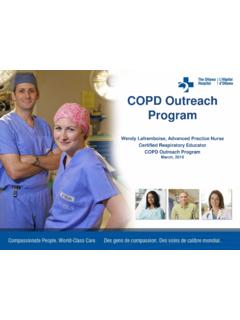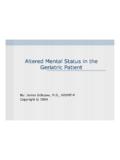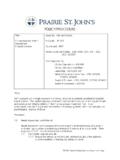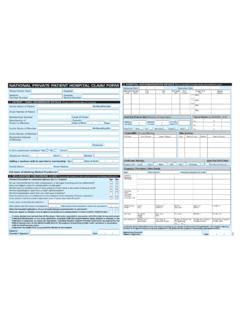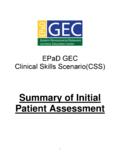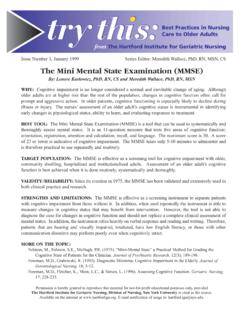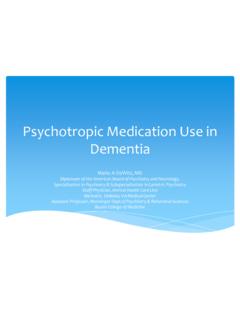Transcription of Examining the Montréal Cognitive Assessment …
1 Cognition and functional independence in geriatric rehabilitation: Examining the montr al Cognitive Assessment (MoCA) and the Kohlman Evaluation of Living Skills (KELS). of Cognitive status is a crucial element of geriatric Assessment and rehabilitation. The Montreal Cognitive Assessment (MoCA) is a newer Cognitive screening tool designed to assess a broader range of Cognitive domains. Interest in the MoCA is growing, but as of yet, we know very little about its relationship with an individual s ability to perform tasks of daily living.
2 The objective of this study was to evaluate the relationship between mental status, as measured by the MoCA, and degree of autonomy in day-to-day functioning as measured by the Kohlman Evaluation of Living Skills (KELS). A prospective cohort of patients aged 65 and older admitted to an inpatient geriatric rehabilitation service (n = 47) were assessed using the MoCA and KELS at both admission and discharge. Using one-way ANOVA tests, MoCA scores of patients deemed independent on the KELS were compared with those of patients needing assistance in day-to-day activities.
3 Results show that patients who function independently in their daily activities score significantly higher on the MoCA than those who require assistance at both admission (p < ) and discharge (p < ). The findings support our prediction that patients with higher mental status scores function more autonomously in their activities. Therefore, the MoCA seems not only useful for assessing mental status but may also help clinicians anticipate how well patients will function in their instrumental activities of daily living once discharged from the rehabilitation screening is an integral part of geriatric Assessment , diagnosis and older adults, research has shown that Cognitive status, as assessed by global measures of Cognitive ability, are significant correlates of function (Baird, et al, 2001; Twamley, et al.)
4 , 2002) and rehabilitation outcome (Ruchinskas, et al., 2001). In fact, Zimnavoda et al., (2002) found a strong correlation between the MMSE and the KELS and the MMSE was the strongest predictor of performance on the the context of such studies, and geriatric Assessment more generally, the most commonly used screening tool is the MMSE. As a new screening tool, the MoCA is gaining popularity. Nonetheless, the extent of published data regarding its broader validity or clinical utility is still : Evaluate the relationship between mental status, as measured by the MoCA, and degree of autonomy in day-to-day functioning as measured by the Kohlman Evaluation of Living Skills (KELS).
5 Hypothesis: There will be a significant difference on the MoCA between patients who can manage their activities independently and those who require assistance. More specifically, those who are independent will obtain higher MoCA and ResultsReferencesBaird, A., Podell, K., Lovell, M., & Bell McGinty, S. (2001). Complex Real-World Functioning and Neuropsychological Test Performance in Older Adults. The Clinical Neuropsychologist, 15 (3), Thompson, L. (1992). The Kolhman Evaluation of Living Skills.
6 American Occupational Therapy Association. Rockville , Z., Philips, N., B dirian, V., Charbonneau, S., Whitehead, V., Collin, I., Cummings, J., & Chartkow, H. (2005). The Montreal Cognitive Assessment , MoCA: A Brief Screening Tool for Mild Cognitive Impairment. Journal of the American geriatric Society, 53, , J., Wong, J., Dafaeeboini, N., Edwards-Lee, T., Lu, P., Aleassi, C., Josephson, K. (2009). Predicting Everyday Functional Abilities of Dementia Patients with the Mini-Mental State Exam. Journal of geriatric Psychiatry and Neurology, 22 (1), , R.
7 , Singer, H., & Repetz, N. (2001). Clock Drawing, Clock Copying, and Physical Abilities in geriatric Rehabilitation. Archives of Physical Medicine and Rehabilitation, 82, , E., Doshi, R., Nayak, G., Palmer, B., Golshan, S., Heaton, R., Patterson, T., & Jeste, D. (2002). Generlized Cognitive Impairments, Ability to Perform Everyday Tasks, and Level of Independence in Community Living Situations of Older Patients with Psychosis. Amercican Journal of Psychiatry, 159 (12), , T., Weinblatt, N., & Katz, N.
8 (2002). Validity of the Kohlman Evaluation of Living Skills (KELS) with Israeli Elderly Individuals Living in the Community. Occupational Therapy International, 9 (4), of key findings The results support our hypothesis in that there is a significant difference between independent patients and those who need assistance on mental status testing, as measured by the MoCA. Patients who are independent in their daily activities obtain significantly higher scores on the MoCA than patients who require assistance.
9 This held true over time and regardless of the point at which their level of autonomy was assessed. Implications and future studies While acknowledging the limitations inherent to brief measures of Cognitive status, the MoCA seems not only be useful for assessing mental status but may also help clinicians anticipate patients level of autonomy in regards to instrumental activities of daily living and therefore be better able to support families as they make discharge From a diagnostic point of view, Razani et al.
10 (2009) note that diagnosis of dementia requires some understanding of patients functional abilities. As such, these findings support the notion that the MoCA can aid in distinguishing patients who would satisfy criteria for a diagnosis of dementia from those who may not. Qualitative examination of the scores shows that the MoCA scores of Independent patients approach the cut-off score recommended by the authors, whereas the scores of patients Requiring Assistance are more clearly below this threshold.


